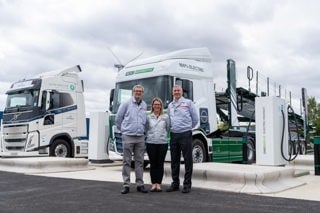Employees must understand the benefits of plug-in cars if fleets are to drive cost savings and help boost the number of electric vehicles (EVs) on UK streets.
Plug-in market share of the new car market – estimated to be 2.7 million units in 2016 – stands at around 1.5%, with fleets responsible for more than two-thirds (70%) of the 30,000-plus EVs registered so far this year.
But, with the Government keen to address air quality concerns and meet its own target for almost all cars and vans to be zero-emission by 2050, it needs the fleet sector to help more drivers make the switch.
“Businesses have a role to play in boosting the numbers of electric vehicles on our roads,” said transport minister, John Hayes. “Gradually making fleets zero-emission would improve air quality, as well as helping companies reduce their costs.”
The Government recently made £7.5m available to employers who want to install chargepoints, a move which Hayes says shows its commitment to making it easier for companies to adopt plug-in cars.
However, while new, longer range EVs such as the 250-mile Renault Zoe will widen fleet appeal, a survey from Go Ultra Low found that only 25% of businesses currently offer electric company cars to employees.
Robert Evans, chair of the Electric Vehicle Supply Equipment Association, believes an unwillingness by some to consider the technology is down to “the LPG effect”.
He said: “There is still a lot of people in the fleet management industry who felt they were burnt .”
However, he told the ‘future of the car’ summit organised by Go Ultra Low in London the fleet sector had nothing to fear from plug-in vehicles.
“It’s quite understandable to be risk averse when you’re procuring anything for your company, but the evidence from fleets is that this can be something that can lead to savings,” explained Evans.
Britvic has reduced its fuel bill by 9% and its carbon footprint by 10%, and cut the total cost of the fleet by 20% over a two-year period, after adopting more than 50 plug-in vehicles. Operating a fleet of around 400 cars and 100 vans, the soft drinks giant argued that good communication with employees, recognising the need for workplace charging and enhanced allowances for drivers to help drive early adoption, were key to its success.
Will Smith, senior reward and performance manager at Britvic, with responsibility for fleet, warned: “Unless you’re providing the infrastructure for employers to utilise these vehicles, you’re never going to get the take-up. They may still choose them because there are wonderful tax advantages, but all you will see is your fuel costs go through the roof.”
Despite only one in four fleets saying that they offered a plug-in option on choice lists, new research from LeasePlan UK suggests a growing interest within the public sector.
Almost a third of respondents said they were already operating at least one pure EV, with a further third considering adopting the technology and more than one in 10 conducting trails.
Oliver Boots, brand director of LeasePlan’s public sector trading arm Automotive Leasing, said: “The public sector is really leading the charge when it comes to driving the rise of electric vehicles, with 38% stating the need to introduce these vehicles into their fleet in order to meet upcoming environmental legislation.”
It remains to be seen how the Government may address the growing air quality crisis following a High Court ruling which said it must go back to the drawing board.
However, there was a word of warning from Nick Lyes, road policy spokesman at the RAC. He concluded: “Many motorists and businesses will feel worried that they are going to be unfairly targeted with punitive charges, especially those who heeded advice in 2009 to switch to diesel vehicles because it was considered the right choice environmentally.
“Demonising diesel vehicles as a whole is also extremely short-sighted. Some of the newest diesel vehicles on the road are also some of the cleanest, and diesels will also play a role in helping to reduce CO2 emissions, which contribute to man-made climate change.”























Rob Chisholm, Applewood Vehicle Finance Ltd - 28/11/2016 13:04
It's all very well targeting the fleet sector ... however for a large majority of need drivers there is simply no real choice available. Renault Zoe's and Nissan Leaf's are fine for the commuters who drive to the office, park up, and then go home. The same goes for the CEO and Directors in their shiny new Tesla's. But for the people out there who are expected to put in the miles in their Passats, Mondeo's and A4's there is still little, practical choice available to them. And yet these are the people who are being hit the hardest of all, BiK wise. The Government (in the shape of the treasury) are the one's who control the policies, and yet public transport, which is what would really help to drive down emissions and what the Government can have direct control over, is still light years behind it becoming a viable alternative for too many. The manufacturers are hardly blame free in this either. They had been promising the hydrogen alternative for many years - many of us believed that this was the future. Either they have also been believing their own publicity too much, haven't pursued this avenue strongly enough, or they haven't been as influential with Governments around the globe as they should have. Until we can produce enough eco-electricity to power all of these EV's then it is also nothing more than a window dressing for pure political purposes.